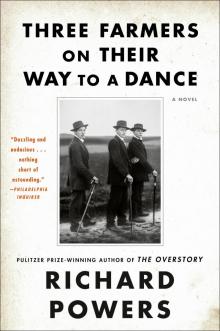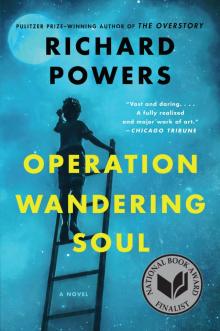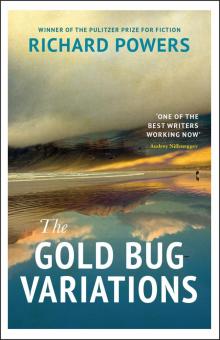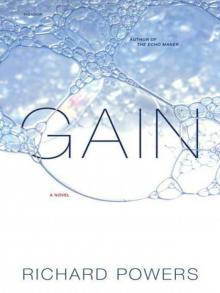- Home
- Richard Powers
Bewilderment Page 10
Bewilderment Read online
Page 10
Robin tugged on my arm. Who do you think that guy is?
“What guy?”
The one whose brain I’m copying?
“It’s not one guy. It’s the average pattern of a few different people.”
He slapped my hand from underneath, like he was patting a ball into the air. His chin lifted and he skipped a few yards, the way he used to when he was younger. Then he waited for me to catch up. My son looked happy, and it chilled me.
“Why do you ask, Robbie?”
I feel like they’re coming over to my house to hang out or something. Like we’re doing stuff together, in my head.
THE LAWS THAT GOVERN THE LIGHT FROM A FIREFLY in my backyard as I write these words tonight also govern the light emitted from an exploding star one billion light-years away. Place changes nothing. Nor does time. One set of fixed rules runs the game, in all times and places. That’s as big a truth as we Earthlings have discovered, or ever will, in our brief run.
But the place is big, I tried to tell my son. “You can’t imagine how big. Think of the most unlikely place . . .”
A planet made out of iron?
“For instance.”
Pure diamond?
“They exist.”
A planet where the oceans are hundreds of miles deep? A planet with four suns?
“Yes times two. And we’ll find even stranger places, between here and the universe’s edge.”
Okay. I’m thinking of my perfect planet. My one-in-a-million place.
“At one in a million, there are roughly ten million of them in the Milky Way alone.”
OUR DAYS SEEMED TO IMPROVE, and not just because I looked for evidence. His December school evaluations were his second-best ever. His teacher, Kayla Bishop, penned a message at the bottom of his report: Robin’s creativity is growing, along with his self-control. He stepped off the bus in the afternoons humming. One Saturday he even went out sledding with a group of neighborhood kids he barely knew. I couldn’t remember the last time he’d left the house to be with anyone other than me.
He came home the Friday before winter holidays with a length of jute twine taped to his rear belt loop. I slid it through my fingers. “What’s this?”
He shrugged as he put his mug of ginger hazelnut milk into the microwave. My tail.
“Are you doing genetic engineering in science these days?”
His smile was as mild as the May-like December. Some kids clipped it on to torture me. You know. Like: “Animal lover” or something. I just left it on.
He took his hot milk to the table, where his art supplies had been spread out for weeks, and began poring over candidates for his next portrait.
“Oh, Robin. What jerk-faces. Did Kayla know?”
He shrugged again. No biggie. Kids laughed. It was fun. He lifted his head from his work and looked at some small revelation on the wall behind me. His eyes were clear and his face inquisitive, the way he used to look on his best days when his mother was still alive. What do you suppose that’s like? Having a tail?
He smiled to himself. Painting, he made jungle sounds under his breath. In his mind, he was hanging upside down from a tree branch and waving his hands in the air.
I feel bad for them, Dad. I really do. They’re trapped inside themselves, right? Same as everyone. He thought for a minute. Except me. I’ve got my guys.
It creeped me out, the way he said it. “What guys, Robbie?”
You know. He frowned. My team. The guys inside my head.
For Christmas we drove back down to Aly’s parents’ in Chicago. Cliff and Adele were a little stiff, welcoming us. They hadn’t yet forgiven my little atheist’s Thanksgiving assault on their core beliefs. But Robbie pressed his ear into each of their bellies, and they warmed to his embrace. He proceeded to hug every one of his cousins who put up with it. In a handful of minutes, he managed to freak out Aly’s entire family.
Over the course of two days he sat through all the football and religion, took a ping-pong paddle to the temple, and watched his cousins react to his gifts—paintings of endangered species—with varying degrees of suppressed mockery. He did this all without melting down. When at last he showed signs of breaking, we were close enough to departure that I shoehorned him into the car and escaped before anything could mar our first incident-free holiday since Aly’s death.
“How was that?” I asked him on the way back to Madison.
He shrugged. Pretty good. But people are touchy, aren’t they?
THE PLANET STASIS looked so much like Earth. The flowing water and green mountains where we touched down, the woody trees and flowering plants, the snails and worms and flying beetles, even the bony creatures were cousins to those we knew.
How can that be? he asked.
I told him what some astronomers now thought: a billion or more planets at least as lucky as ours in the Milky Way alone. In a universe ninety-three billion light-years across, Rare Earths sprang up like weeds.
But a few days on Stasis showed the place to be as strange as any. The planet’s axis had little tilt, which meant one monotone season at every latitude. A dense atmosphere smoothed out fluctuations in temperature. Larger tectonic plates recycled its continents with few catastrophes. Few meteors ever threaded the gauntlet of massive nearby planets. And so the climate on Stasis had stayed stable through most of its existence.
We walked to the equator, across the layers of planetary parfait. Species counts in every band were huge and filled with specialists. Each predator hunted one prey. Every flower kept a pollinator of its own. No creature migrated. Many plants ate animals. Plants and animals lived in every kind of symbiosis. Larger living entities weren’t organisms at all; they were coalitions, associations, and parliaments.
We walked on to one of the poles. The boundaries between biomes ran like property lines. No flux of seasons blurred or softened them. From one step to the next, deciduous trees stopped and conifers began. Everything on Stasis was built to solve its own private spot. Everything knew one, infinitely deep thing: the sum of the world at their latitude. Nothing alive could thrive anywhere else. A move of even a few kilometers north or south tended to be fatal.
Is there intelligence? my son asked. Is anything aware?
I told him no. Nothing on Stasis needed to remember much or predict much further out than now. In such steadiness, there was no great call to adjust or improvise or second-guess or model much of anything.
He thought about that. Trouble is what creates intelligence?
I said yes. Crisis and change and upheaval.
His voice turned sad and wondrous. Then we’ll never find anyone smarter than us.
THE TECHS GOT A KICK OUT OF ROBIN. They liked to tease him, and, amazingly, he liked being teased. He enjoyed it almost as much as he liked conducting his own private feedback symphonies and directing his own private training animations. Ginny told him, “You’re really something, Brain Boy.”
“Definitely a high-performing decoder,” Currier agreed. The two of us sat in his office surrounded by toys, puzzles, optical illusions, and life-affirming posters.
“Is that because he’s so young? Like how kids learn a new language without trying?”
Marty Currier tipped his head to one side. “Plasticity has been documented at every stage of life. Habit impedes us as we age as much as any change in innate capacity. These days we like to say that ‘mature’ is just another name for ‘lazy.’ ”
“What makes him so good at the training, then?”
“He’s a distinctive boy, or he wouldn’t be in the training in the first place.” He picked up a Rubik’s dodecahedron from his desk and toyed with it. His eyes turned absent and I knew who he was daydreaming about. He spoke, more to himself than to me. “Aly was the most incredible birder. I’ve never seen anyone so focused. She was pretty out there, herself.”
My head snapped to attention in resentment and anger. Before I could tell him he was a creep who knew nothing at all about my wife, the door opened a
nd Robin spilled in.
Best game ever.
“Brain Boy really racked up the points, today,” Ginny said, squeezing his shoulders from behind like a coach massaging a prize boxer.
When everyone starts doing this stuff, it’s going to be really cool.
“Exactly what we think.” Martin Currier set down his puzzle and raised both hands in the air. Robin ponied up to his desk and gave him ten. I took my son home, feeling like the future’s guardian.
I COULD SEE THE WEEKLY CHANGES. He was quicker to laugh now, slower to flare. More playful when frustrated. He sat still and listened to the birds at dusk. I wasn’t sure which qualities were his and which came courtesy of his team. Each day’s small changes blended into him and went native.
One night, I made a planet for him where the several species of intelligent life traded bits of temperament and memory and behavior and experiences as easily as Earthly bacteria trade snippets of genes. He grabbed my arm, smiling, before I could add the details. I know where you stole that one from!
“Do you, now? Who told you?”
He spread his fingers and attached them to my skull, making a sucking sound, as bits of our personality flew back and forth between us. Wouldn’t it be cool if everybody started to do the training?
I put my fingers on his skull in exchange, sucking bits of his private emotions out through my fingertips and into me, accompanied by appropriate sound effects. We laughed. Then he clapped my shoulder, like he was calming me down before sending me to bed. The gesture was so preternaturally adult. It came from a place that hadn’t been there the week before.
“So what do you think?” I tried for amused and offhand. “The mouse. He’s changing?”
His eyes took hold of the puzzle. He remembered, and the solution blazed in his eyes. Still the same mouse, Dad. I just have help now.
“Tell me how that works, Robbie.”
You know how when you talk to someone stupid and it makes you stupid, too?
“I do know that feeling. Very well.”
But when you play a game against someone smart, you start making better moves?
I tried to remember if he’d spoken like this a month ago.
Well, it’s like that. Like walking onto the playground. But three really smart, funny, and strong guys are walking with you.
“Do . . . they have names?”
Who?
“These three guys?”
He laughed like a much younger kid. They’re not really guys. They’re just . . . my allies.
“But . . . there are three of them?”
He shrugged, more defensive, more like my son. Three. Or four. Who cares? That’s not the point. Just: like, they’re helping to row the boat or something. My crew.
I told him he was my mouse of mouses. I told him his mother loved him. I said he should always feel free to tell me anything interesting that he was finding out about the boat ride.
Maybe I hugged him too hard on my way out of the room. He pulled away and shook me by the upper arms.
Dad! It’s no big deal. Just . . . He stuck out a pair of fingers from each hand and crossed them against each other. Hashtag life skills, right?
GUSTS OF ROBIN’S OLD IMPATIENCE rocked him, waiting for the spring’s first farmers’ market. He hit on the idea of taking his paintings to school to find some buyers. He had a mailing tube under his arm and one foot out the door to catch the bus when he sprang that plan on me.
“Oh, Robbie. That’s not a great idea.”
Why? His voice wavered on the edge of raw. You think they’re too crappy?
The respite had spoiled me. I thought we were in the clear. I thought his team had rowed us to safety.
“They’re too good. Your classmates can’t afford to pay you what they’re worth.”
He hunched over. Anything would help. Thousands of creatures are going extinct every year. And so far I’ve raised zero dollars and zero cents to help them.
He was right, on all counts. He lifted the tube in the air, challenging. My chin rose and fell half an inch, and he was out the door.
My morning passed in nervous distraction. By one-thirty I was so worked up I called the school and told them to tell Robin I’d pick him up when the day was over. I was waiting in the parking lot, practicing nonchalance and bracing for the worst, when he let himself into the car.
“How did it go?”
He held up the mailing tube, as if to show all the paintings still rolled up inside it. Still zero dollars and zero cents.
“Digame.”
For a mile, he wouldn’t. He beat the tube on the dash at a steady andante. I had to touch him on the shoulder to get him to quit. He breathed like he was on a ventilator.
They thought I was just being weird. They started in on me. “Dr. Strange.” Like that, okay? Then they started calling the paintings things.
“What kind of things?”
Josette Vaccaro might have bought one, if nobody else had been there. I finally said I’d give whatever pictures they wanted, and they could pay whatever. Jayden said he’d give me a quarter for the Amur leopard. So I sold it to him.
“Oh, Robbie.”
Ethan Weld thought that was funny, so he offered five cents for the eastern gorilla. He said he wanted it to remember me by when I went extinct. Other kids started giving me change, and I thought: Better than nothing, right? At least I can send something in. Then Kayla made me return all the money and take the pictures back.
I still wasn’t used to students calling their teachers by first names. “She was trying to rescue you.”
She gave me a demerit. She said it was against the rules to sell things on the school grounds, and I should have known that from the class handbook. I asked her if she knew that half the large animal species on the planet would be gone by the time we reached her age. She said we were on social science, not biology, and don’t talk back, or I’d get another demerit.
I drove. I doubted there was a useful thing to say. I was done with humans. We pulled into our driveway. He put his hand on my upper arm.
There’s something wrong with us, Dad.
Right again. Something wrong with the two of us. Wrong with all seven and two-thirds billion. And it would take something faster, stronger, and more efficient than DecNef to save anyone.
IN EARLY MARCH THE PRESIDENT INVOKED the National Emergencies Act of 1976 to arrest a journalist. She’d been publishing accounts from a White House leaker and refused to reveal her source. So the President ordered the Justice Department to order the Treasury to release any Suspicious Activity Reports on her. Based on those reports and on what the President called “credible tips from foreign powers,” he took her into military custody.
The media cried bloody murder. At least, half the media did. The top three opposition candidates for the next fall’s election said things the President condemned as “aiding and abetting America’s enemies.” The minority Senate leader called the action the gravest constitutional crisis in our lifetime. But constitutional crises had become commonplace.
Everyone waited for Congress to move. There was no movement. Senators in the President’s party—old men armed with polls—insisted that no laws had been broken. They scoffed at the idea of First Amendment violations. Violent clashes rolled through Seattle, Boston, and Oakland. But the general public, including me, once again proved how good the human brain was at getting used to anything.
Everything had happened in broad daylight, and against shamelessness, outrage was impotent. The crisis gave way to another flavor of craziness two days later. But for two days, I was strapped to the news. I’d sit in the evenings, doom-scrolling, while Robbie painted endangered species at the dining room table.
Sometimes I worried that Decoded Neurofeedback had left him too calm. It didn’t seem natural for any boy his age to be so single-minded. But, addicted to the national emergency, I was no one to talk.
One night, the news channel I distrusted the least cut from the fading constitut
ional crisis to an interview with the world’s most famous fourteen-year-old. The activist Inga Alder had launched a new campaign, biking from her home near Zurich to Brussels. Along the way, she was recruiting an army of teenage cyclists to join her and shame the Council of the European Union into meeting the emissions reductions they had long ago promised.
The journalist asked her how many bicyclists had joined her caravan. Miss Alder frowned, looking for a precision she couldn’t give. “The number changes each day. But today we are over ten thousand.”
The journalist asked, “Aren’t they enrolled in school? Don’t they have classes?”
The oval-faced girl in tight pigtails blew a raspberry. She didn’t look fourteen. She barely looked eleven. But she spoke English better than most of Robin’s classmates. “My house is burning down. Do you want me to wait until the school bell rings before I rush home to put it out?”
The journalist plunged on. “Speaking of school, how do you answer the American President when he says you should study economics before telling world leaders what to do?”
“Does economics teach you to shit your nest and throw away all the eggs?”
My pale, odd son drifted from the dining room and stood at my side. Who is that? He sounded hypnotized.
The interviewer asked, “Do you think there’s any chance this protest might succeed?”
She’s like me, Dad.
My scalp burned. I recalled why Inga Alder sounded ever so slightly otherworldly. She’d once called her autism her special asset—“my microscope, telescope, and laser, put together.” She’d suffered from deep depression and had even tried to take her own life. Then she found meaning in this living planet.
She cocked an eye at the bemused journalist. “I know our chance of failure if we do nothing.”
That’s what I’m saying! Exactly!
Robin twitched so hard I reached out to calm him. He pulled away. He had no use for calm. I don’t know why it felt so painful and bottomless, to be sitting three feet away at the moment my son first fell in love.

 The Overstory
The Overstory Bewilderment
Bewilderment Three Farmers on Their Way to a Dance
Three Farmers on Their Way to a Dance Operation Wandering Soul
Operation Wandering Soul Prisoner's Dilemma
Prisoner's Dilemma The Gold Bug Variations
The Gold Bug Variations Generosity: An Enhancement
Generosity: An Enhancement The Echo Maker
The Echo Maker Orfeo
Orfeo The Time of Our Singing
The Time of Our Singing PLOWING THE DARK
PLOWING THE DARK Generosity
Generosity Gain
Gain